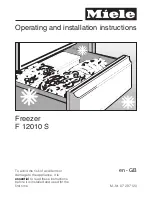
INSTRUCTIONS FOR USE
GB
DIAGRAM OF THE APPLIANCE (Fig. 1)
A.
Handle.
B.
Safety lock (if provided).
C.
Gasket.
D
. Separator (if provided).
E.
Defrost water drain plug.
F.
Control panel.
G.
Side motor cooling grille.
DIAGRAM OF THE CONTROL PANEL (Fig. 2)
1. Temperature adjustment
thermostat.
2.
Red light
(if provided): indicates that the temperature
inside the product is not low enough.
3.
Green LED (if provided):
when lit, indicates that the
appliance is running.
4.
Yellow/orange illuminated button (if provided)
:
activates/deactivates the fast freeze function.
When lit, it indicates that the fast freeze function is active.
The fast freeze function automatically deactivates after
about 50 hours.
The exact configuration of the control panel may
vary according to the model.
BEFORE USING THE APPLIANCE
Your new appliance is designed to be used in the household
and similar applications such as:
- kitchen areas in shops, offices and other working
environments
- farm
houses
- by clients in hotels, motels, residences, bed & breakfasts.
The product must only be used to store frozen food, to
freeze fresh food and to make ice.
Regulations require the appliance to be earthed. The
manufacturer declines all liability for injury to
persons or animals and for damage to property
resulting from failure to observe the above
procedures and reminders.
1.
After unpacking, make sure that the appliance is undamaged
and that the door closes perfectly, with the gasket remaining
intact. Any damage must be reported to your retailer within
24 hours after delivery of the appliance.
2.
Wait at least two hours before switching the appliance
on in order to ensure the refrigerant circuit is fully
efficient.
3.
Installation and electrical connection must be carried out
by a qualified technician, according to the manufacturer's
instructions and local safety regulations.
4.
Clean the inside of the appliance before using it.
• Before connecting the appliance to the mains supply,
ensure that the voltage corresponds to that given on the
rating plate located on the rear of the appliance.
• Electrical connections must be made in accordance
with local regulations.
INSTALLATION
• Unpack the appliance.
• Remove the 4 spacers inserted between the door
and the appliance. (Fig 3)
• Make sure the defrost water drain plug (if provided) is
correctly positioned (E).
• For optimum appliance operation and to avoid damage
when the door is opened, leave a space of at least 7 cm
from the rear wall and 7 cm at the sides. (
Fig 4
)
• Fit the accessories (if provided).
SWITCHING ON THE APPLIANCE
• The appliance is factory set for optimum operation at a
temperature of -18°C.
• Plug in the appliance.
• The green LED lights up (if provided).
• Also the red LED (if provided) will switch on because
the temperature inside the appliance is not yet
sufficiently low for food storage. The red LED will
normally switch off within the first six hours after the
appliance is switched on.
• After connecting the appliance to the mains supply and
when the optimal temperature has been reached (this
phase takes about 1 hour during which the lid will not
open), ensure that the fast freeze button is not pressed
(the yellow LED, if provided, is off).
• Place food inside the product only when the red LED (if
provided) has switched off.
• Thanks to the efficient lid seal, the appliance lid will not
re-open easily immediately after closing. Wait a few
minutes before re-opening the lid of the appliance.
TEMPERATURE ADJUSTMENT
Use the thermostat to select the ideal storage temperature.
To adjust the internal temperature, proceed as follows:
• Turn the thermostat knob to 1 for a storage
temperature that is less cold.
• Turn the thermostat knob to 6 for a colder storage
temperature.
• For partial loads, or when the load indicator is below
the "e" symbol inside the appliance, it is advisable to
move the thermostat to the lower position (on "e", if
present on the thermostat scale)
FREEZING FOOD
Preparation of fresh food for freezing
• Before freezing, wrap and seal fresh food in: aluminium
foil, cling film, air and water-tight plastic bags,
polyethylene containers with lids, provided they are
suitable for freezing foods.
• Food must be fresh, mature and of prime quality in
order to obtain high quality frozen food.
• Fresh vegetables and fruit should preferably be frozen
as soon as they are picked to maintain the full original
nutritional value, consistency, colour and flavour.
• Always leave hot food to cool before placing in the
appliance.
Freezing fresh food
• Place foods to be frozen in direct contact with the walls
of appliance (Fig. 5):
A) - foods to be frozen,


























